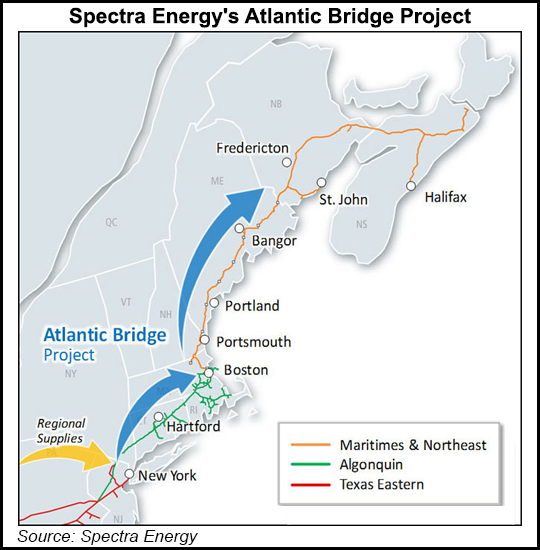Regulatory | NGI All News Access | NGI The Weekly Gas Market Report
NatGas Pipeline Protesters Still Hammering FERC Over Lack of Quorum
Pipeline opposition groups continue to cite FERC’s lack of a quorum in procedural arguments as they seek to stall recently certificated natural gas pipelines from proceeding to construction.

This week, a coalition of groups led by Food & Water Watch asked the Federal Energy Regulatory Commission to deny a request submitted last week by developer Algonquin Gas Transmission LLC to proceed with some construction activities on the Atlantic Bridge expansion [CP16-9].
The groups wrote that the Feb. 3 departure of former Chairman Norman Bay, which left FERC at two sitting Commissioners, puts them in an “unusual position” as they await an action on a rehearing request they submitted last month.
FERC issued a certificate order for Atlantic Bridge, a 132,700 Dth/d expansion of the Algonquin and Maritimes & Northeast pipeline systems in New England, in January. The project, backed by Calgary-based Enbridge Inc. after its merger with Spectra Energy, received a favorable environmental assessment last May.
Echoing prior arguments raised against Atlantic Bridge and against Transcontinental Gas Pipe Line Co.’s recently certificated Atlantic Sunrise expansion, the groups told FERC that “it would be unfair” to allow Algonquin to proceed with construction without acting on their rehearing request.
FERC staff has been authorized to issue tolling orders on rehearing requests to put them on hold until the Commission’s quorum is restored and it can act on those requests. Without a tolling order, the requests would be automatically denied after 30 days without Commission action.
“While FERC staff issued a tolling order last week in response to rehearing requests” for Atlantic Sunrise “and is expected to do so for the Atlantic Bridge project this week, there can be no response to the substance of our rehearing request nor a response to our motion for stay in the absence of a quorum,” the groups wrote.
Previously, a coalition of groups challenging Atlantic Sunrise asserted that FERC’s use of tolling orders “has allowed project proponents to engage in extensive construction activities (and in some cases place facilities into service) before FERC addresses the issues raised in timely filed rehearing requests, thus effectively depriving parties of judicial review.”
Pipeline protesters filing rehearing requests challenging project approvals is nothing new, but the novelty of the current situation — a Commission unable to act on rehearing requests for recently certificated projects — raises the risk that a federal appellate court could grant a stay, analysts with ClearView Energy Partners have said. But they added that a stay, if granted, might be as short as a week.
“Pipeline opponents to date have not been successful in securing stays before the Commission acts on rehearing, and therefore a petition for stay on these more recently approved projects may not fare better than earlier cases,” ClearView wrote in a note to clients earlier this month.
Algonquin and Maritimes are targeting a November 2017 in-service date for the project.
© 2024 Natural Gas Intelligence. All rights reserved.
ISSN © 1532-1231 | ISSN © 2577-9877 | ISSN © 1532-1266 |
